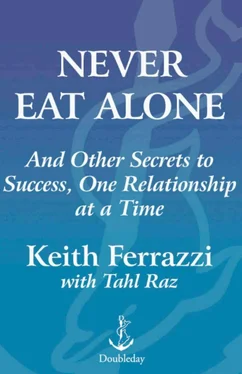Keith Ferrazzi - Never Eat Alone
Здесь есть возможность читать онлайн «Keith Ferrazzi - Never Eat Alone» весь текст электронной книги совершенно бесплатно (целиком полную версию без сокращений). В некоторых случаях можно слушать аудио, скачать через торрент в формате fb2 и присутствует краткое содержание. Год выпуска: 2005, ISBN: 2005, Издательство: C U R R E N C Y • D O U B L E D A Y, Жанр: marketing, на английском языке. Описание произведения, (предисловие) а так же отзывы посетителей доступны на портале библиотеки ЛибКат.
- Название:Never Eat Alone
- Автор:
- Издательство:C U R R E N C Y • D O U B L E D A Y
- Жанр:
- Год:2005
- ISBN:0-385-51529-4
- Рейтинг книги:4 / 5. Голосов: 1
-
Избранное:Добавить в избранное
- Отзывы:
-
Ваша оценка:
- 80
- 1
- 2
- 3
- 4
- 5
Never Eat Alone: краткое содержание, описание и аннотация
Предлагаем к чтению аннотацию, описание, краткое содержание или предисловие (зависит от того, что написал сам автор книги «Never Eat Alone»). Если вы не нашли необходимую информацию о книге — напишите в комментариях, мы постараемся отыскать её.
Never Eat Alone — читать онлайн бесплатно полную книгу (весь текст) целиком
Ниже представлен текст книги, разбитый по страницам. Система сохранения места последней прочитанной страницы, позволяет с удобством читать онлайн бесплатно книгу «Never Eat Alone», без необходимости каждый раз заново искать на чём Вы остановились. Поставьте закладку, и сможете в любой момент перейти на страницу, на которой закончили чтение.
Интервал:
Закладка:
The recipient will say, "Sorry, but I can't accept the favor because I'm not sure I'll ever be able to repay you"; or "I'd rather not be obligated to anyone, so I'll have to pass." Sometimes, they'll insist right there and then that they return the favor somehow. To me, nothing is as infuriating as encountering such blindness about how things work. Nor is it, as one might assume, a generational issue. I've gotten similar reactions from people of all ages and in all walks of life.
A network functions precisely because there's recognition of mutual need. There's an implicit understanding that investing time and energy in building personal relationships with the right people will pay dividends. The majority of "one percenters," as I call the ultra-rich and successful whom many of my mentees aspire toward, are one percenters because they understand this dynamic—because, in fact, they themselves used the power of their network of contacts and friends to arrive at their present station.
But to do so, first you have to stop keeping score. You can't amass a network of connections without introducing such connections to others with equal fervor. The more people you help, the more help you'll have and the more help you'll have helping others. It's like the Internet. The more people who have access, and use it, the more valuable the Internet becomes. I now have a small army of former mentees, succeeding in any number of industries, helping me to mentor the young people that come to me today.
This is not softhearted hokum; it's an insight that hard-headed business people would do well to take seriously. We live in an interdependent world. Flattened organizations seek out strategic alliances at every turn. A growing pool of free agents are finding they need to work with others to accomplish their goals. More than ever before, zero-sum scenarios where only one party wins often mean, in the long run, that both parties will lose. Win/win has become a necessary reality in a networked world. In a hyper-connected marketplace, cooperation is gaining ground on competition.
The game has changed.
In 1956, William Whyte's bestselling book The Organization Man outlined the archetypal American worker: We donned our gray suit for a large corporation, offering our loyalty in exchange for job security. It was glorified indentured servitude, with few options and few opportunities. Today, however, employers offer little loyalty, and employees give none. Our careers aren't paths so much as landscapes that are navigated. We're free agents, entrepreneurs, and intrapreneurs—each with our own unique brand.
Many people have adapted to these new times with the belief that it's still a dog-eat-dog world, where the meanest, baddest dog in the neighborhood wins. But nothing could be further from the truth.
Where employees once found generosity and loyalty in the companies we worked for, today we must find them in a web of our own relationships. It isn't the blind loyalty and generosity we once gave to a corporation. It's a more personal kind of loyalty and generosity, one given to your colleagues, your team, your friends, your customers.
Today, we need each other more than ever.
Sadly, plenty of people still function as if it were 1950. We have a tendency to romanticize independence. Most business literature still views autonomy as a virtue, as though communication, teamwork, and cooperation were lesser values. To such thinkers, interdependence is just a variation of outright dependence. In my experience, such a view is a career-killer.
Autonomy is a life vest made out of sand. Independent people who do not have the skills to think and act interdependently may be good individual producers, but they won't be seen as good leaders or team players. Their careers will begin to stutter and stall before too long.
Let me give you an example. When I was at Deloitte, I was working on a project for the largest HMO in the country, Kaiser Permanente, forcing me to travel between their two headquarters in San Francisco and Los Angeles, and back to my home in Chicago on the weekend.
It was clear to me early on that I hoped to use the consulting world as a gateway into some other field. Since I was in Los Angeles, I wondered how I might begin to create inroads into the entertainment industry. I wasn't looking to accomplish anything in particular; I just knew that I was interested in the industry, and when the day came to move on, I wanted to break into Hollywood without having to deliver some agent's mail.
Ray Gallo, my best friend from my undergraduate days, was practicing law in Los Angeles, so I called him to get some advice.
"Hey, Ray. Who do you know in the entertainment world that I can talk to for some advice about breaking into the industry? You know any people who'd be open for a short lunch?"
"There's a guy named David who I know through mutual friends who also went to HBS. Give him a call."
David was a smart entrepreneur doing some creative deals in Hollywood. In particular, he had a close connection with a senior executive at one of the studios whom he had also gone to school with. I was hoping I might get a chance to get to know both of them.
David and I met for a cup of coffee at an outdoor cafe in Santa Monica. He was dressed in very dapper casual L.A. attire. I wore a suit and tie, befitting the buttoned-down Midwestern consultant that I was at the time.
After a good deal of back-and-forth, I asked David a question. "I'm thinking about transitioning into the entertainment industry at some point. Is there anyone you know who you think could lend some helpful advice?" I was a good friend of a close friend of his. This seemed like a mild request given the strength of our meeting.
"I do know somebody," he told me. "She is a senior executive at Paramount."
"Great, I'd love to meet her," I said excitedly. "Is there any chance of arranging a quick introduction? Maybe you could pass on an e-mail?"
"I can't," he told me flatly. I was shocked, and my face showed it. "Keith, here's the situation. It's likely that at some point I'm going to need something from this person or want to ask a personal favor. And I'm just not interested in using the equity that I have with this individual on you, or anyone else, for that matter. I need to save that for myself. I'm sorry. I hope you understand."
But I didn't understand. I still don't. His statement flew in the face of everything I knew. He thought of relationships as finite, like a pie that can only be cut into so many pieces. Take a piece away, and there was that much less for him. I knew, however, that relationships are more like muscles—the more you work them, the stronger they become.
If I'm going to take the time to meet with somebody, I'm going to try to make that person successful. But David kept score. He saw every social encounter in terms of diminishing returns. For him, there was only so much goodwill available in a relationship and only so much collateral and equity to burn.
What he didn't understand was that it's the exercising of equity that builds equity. That's the big "ah-ha" that David never seemed to have learned.
Jack Pidgeon, the headmaster of the Kiski School in southwestern Pennsylvania, where I went to high school, taught me that lesson. He'd built an entire institution on his asking people not "How can you help me?" but "How can I help youT
One of the many times Jack came to my aid was when I was a sophomore in college. I'd been enlisted to work during the summer for a woman who was running for Congress against a young Kennedy. Running against a Kennedy in Boston, and for Jack Kennedy's former congressional seat to boot, was for many people a lost cause. But I was young and naive and ready for battle.
Unfortunately, we barely had time to don our armor before we were forced to wave the white flag of surrender. A month into the campaign, we ran out of money. Eight other college kids and I were literally thrown out of our hotel room, which doubled as our campaign headquarters, in the middle of the night by a general manager who had not been paid in too long a time.
Читать дальшеИнтервал:
Закладка:
Похожие книги на «Never Eat Alone»
Представляем Вашему вниманию похожие книги на «Never Eat Alone» списком для выбора. Мы отобрали схожую по названию и смыслу литературу в надежде предоставить читателям больше вариантов отыскать новые, интересные, ещё непрочитанные произведения.
Обсуждение, отзывы о книге «Never Eat Alone» и просто собственные мнения читателей. Оставьте ваши комментарии, напишите, что Вы думаете о произведении, его смысле или главных героях. Укажите что конкретно понравилось, а что нет, и почему Вы так считаете.












